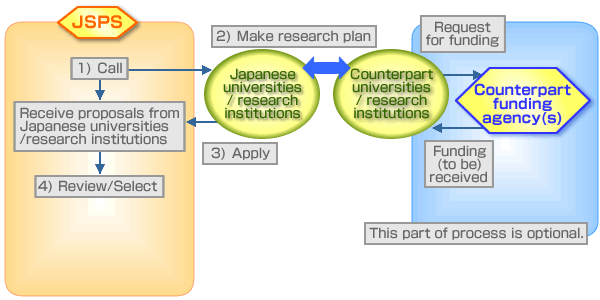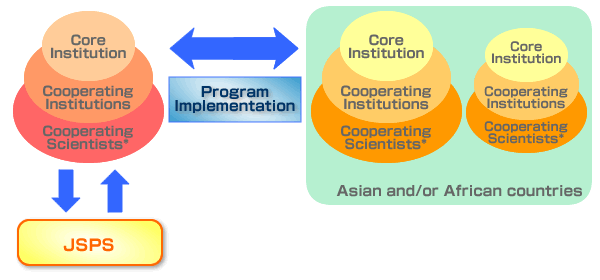This program is designed to create high potential research hubs in selected fields with in the Asian and African region, while fostering the next generation of leading researchers. It does this by establishing sustainable collaborative relations among universities and research institutes in Japan and other Asian and African countries. Under the program, these “core institutions” will collaborate in research fields of special importance or significance to Asia and/or Africa and that is deemed to be of high priority within Japan.
Core institutions in Japan and other Asian and African countries conduct exchanges under the leadership of Japanese core institutions. These exchanges will take the form of joint research, seminars and other scientific meetings, and researcher exchanges, which are to be organized and carried out effectively under the program.
It is anticipated that the hubs formed by the core institutions will continue to carry out research activities after the funded project has ended.
Research Topics of special importance or significance to Asia and/or Africa and deemed to be of high priority within Japan.
(All fields of the humanities, social sciences and natural sciences.)
Asian and African countries (Core institutions may only be established in Asian and African countries; however, individual researchers from other countries or regions, including non-Asian, and non-African, are eligible to participate in projects.)
(1) A full-time researcher employed at a Japanese university or research institute acts as the project coordinator. His/her institution or department sets up the implementation framework and carries out the project.
(2) JSPS provides financial support for carrying out project-related joint research, scientific meetings and researcher exchanges by Japanese core institutions.
(3) JSPS makes a call for proposals to universities/research institutions, and conducts reviews and selections. The actual operation of the selected projects is left to the core institutions themselves. Counterpart core institutions in Asian and African countries are encouraged to obtain financial support from science-promotion agencies or other funding organizations in their respective countries.
[Application and Selection Process]

From April 2008 through March 2011 (under the FY2008 call)
JSPS will provide Japanese core institutions with the following funding:
Up to ¥ 5 million per fiscal year.).
Funding by JSPS
| Cost Items | Coverable by JSPS | |
| Japan-side researchers | International airfare | yes |
| Maintenance in host country | yes | |
| Travel in Japan | yes | |
| Research grant | yes | |
| Other-side researchers | International airfare | yes |
| Maintenance in Japan | yes | |
| Travel in home country | no | |
| Research grant | yes | |
| Cost for holding seminars in Japan | yes | |
| Cost for holding seminars in other country | yes | |
| Research equipment costs at core institution | no | |
About ten projects.
8.Application Screening
Applications are screened from the following perspectives:
(1) Need for the proposed project and collaboration
– Whether the research project is recognized as being of common interest and special importance to the Asian and African regions and whether it is scientifically meaningful for Japan to conduct priority research in the subject fields.
– Whether there is a clear need and value for the Japanese core institution to take the lead in carrying out the research collaboration with counterpart institutions in Asia and/or Africa.
– Whether results of high scientific value can be expected through the collaboration between the participating institutions.
– Whether the project will build upon and expand the core institutions’ past international research activities and accomplishments.
(2) Young researchers fosterage
– Whether the project includes a program for honing the skills and expertise of young researchers
(3) Implementation framework on Japan side
– On the Japan side, plans to build a core research hub should be strategically placed within the core institution’s overall research program.
– Japanese core institutions should have in place on an institutional level a system for ensuring the ongoing implementation of the proposed project.
– The project should be capable of enlisting the participation of researchers in Japan who are appropriately qualified to build a core research hub in the subject field.
– The project should be capable of continuing as a core research hub after funding under this program has ended.
(4) Network building with counterpart core institutions
– The match-up of Japanese and counterpart institutions under the project should be one that holds good promise for sustained research collaboration.
– A framework for implementing the project, such signing a cooperative agreement, should be established between the core institutions.
– As a core research hub in the subject field, the project should be expected to contribute to the continuous development of collaboration between the core institutions in the future.
(5) Appropriateness of research plan
– Whether the plan is sufficiently concrete to achieve the project objectives and its contents are highly attainable.
– Whether the research plan is practicable in terms of both its fiscal and operational scope.
9.Points with Regard to Project Application
(1) Research collaboration is carried out between a core institution in Japan and one or more core institutions in other Asian and/or African countries.
(2) Researchers eligible to receive JSPS financial support under this program are as follows:
– (1) Researchers employed at universities and research institutes. (In case of Japan, researchers eligible to apply for MEXT Grants-in-Aid for Scientific Research.)
– (2) Researchers enrolled in the postgraduate courses, both in the master courses and in the doctoral courses
– (3) Postdoctoral researchers.
(3) The Japanese-side coordinator of this project cannot be the coordinator or principal investigator of other JSPS programs concurrently, i.e., Asian CORE Program, Core University Program, A3 Foresight Program, JSPS Core-to-Core Program, joint research or seminars under JSPS’s bilateral programs, JSPS International Training Program (ITP) or Japanese-German Graduate Externship.
(1) Core institutions are to establish a homepage and proactively post on it information about the project both during and after the funding period. Though JSPS does not participate in negotiations over rights to results yields through the project’s implementation, the core institutions are to credit JSPS for its support when announcing such results.
(2) JSPS’s international program committee will conduct assessments of projects upon their completion. Core institutions are to provide JSPS with all the information requested to conduct these assessments.
(1) JSPS does not bear responsibility for any accident, sickness or other such incident that may occur over the period of the project’s implementation
(2) Information about the project may be posted on JSPS’s homepage and provided to related institutions. Such information includes the names of the core institutions, the names of the coordinators and other participants, the project’s annual implementation plans and annual reports, and the results of project assessments.
(3) If over the course of the project’s implementation improper conduct (plagiarization, fabrication or falsification), misuse of funds, or abuse of authority (sexual harassment or other improper behavior) should be found to occur, the core institution may be required to return either part or all of the already-disbursed project funding to JSPS, and appropriate penalties may be imposed.
(4) JSPS does not support research with military objectives.
[Program Diagram]

* Individual researchers from other countries or regions, including non-Asian and non-African, are eligible to participate in projects as “cooperating scientists”.